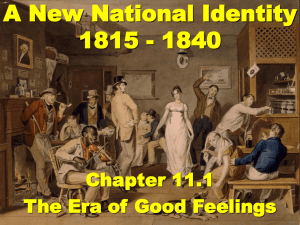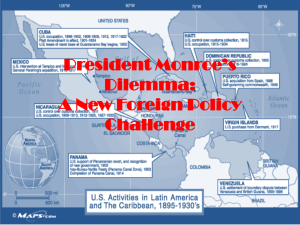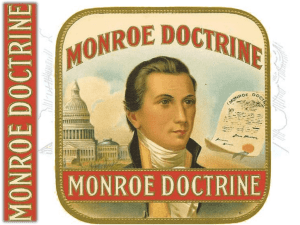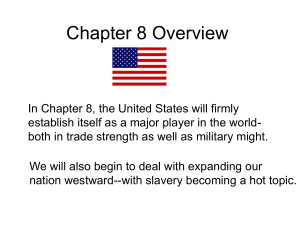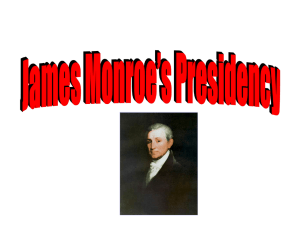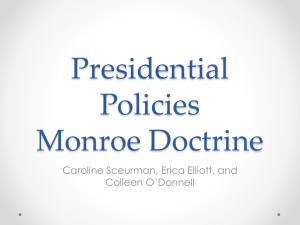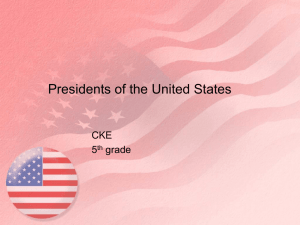The Monroe Doctrine - James Monroe Museum and Memorial Library
advertisement
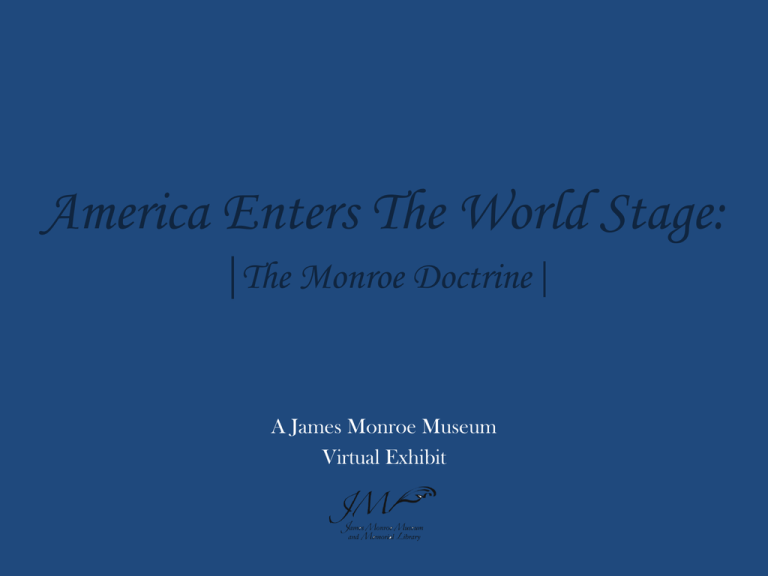
America Enters The World Stage:
|The Monroe Doctrine|
A James Monroe Museum
Virtual Exhibit
|Introduction|
When James Monroe became President in 1817, he
had already served as an ambassador to France,
negotiated the Louisiana Purchase, and served as
Secretary of State during the War of 1812.
America was expanding, both in size and in influence, and
a new American identity was being formed after the war.
Monroe made significant contributions to American
foreign policy throughout this life, most notably through
the Monroe Doctrine.
|The Exhibits|
The Monroes in
Paris
The Monroe
Doctrine
Click an Object to Enter
The Doctrine’s
Legacy
|The Monroes in Paris|
{1794-1796}
The Monroes represented all of America when
they were ambassadors in Europe, at a time when
an American identity was still forming.
What did they seek to convey through their
appearances?
|The Monroes in Paris|
James Monroe wore this three-piece
court suit decorated with nine ornate
steel buttons, faceted to give the
illusion of brilliant stones.
Elizabeth Monroe wore this fawn-colored
silk velvet dress to the coronation. Its
empire style was popular during the
French court of Napoleon I.
JM76.219
JM.76.240
|The Monroes in Paris|
What do you think the
Monroes were trying to
communicate with their
clothes? How would you
describe their appearance?
|The Monroes in Paris|
The way the Monroes dressed in Paris was
intentional and designed to assist them in
presenting a favorable view of America to aid in
ambassadorial responsibilities.
|The Exhibits|
The Monroes in
Paris
The Monroe
Doctrine
Click an Object to Enter
The Doctrine’s
Legacy
|The Monroe Doctrine|
In his seventh annual address to Congress on
December 2, 1823, President Monroe first
articulated the Monroe Doctrine, declaring that
European powers must respect the Western
Hemisphere as the United States’ “sphere of
influence.”
What was the context of the Monroe Doctrine and how did
it impact the United States’ relations with the world?
|The Monroe Doctrine|
“…as a principle in which the rights and
interests of the United States are involved,
the American continents, by the free and
independent condition which they have
assumed and maintain, are henceforth not
to be considered as subjects for future
colonization by any European powers...”
|Reading Primary Sources|
What was Monroe
declaring to the world?
|The Monroe Doctrine|
• Did the Monroe Doctrine change the way
America was viewed by other countries? If so,
how?
• Did Europeans take the Monroe Doctrine and
America as a nation seriously?
• Was it possible for America to be isolated
during the early Republic?
|The Monroe Doctrine|
The Monroe Doctrine became a foundation piece of
American foreign policy and helped solidify a new American
identity to the world. In declaring the Western Hemisphere
unavailable to European interference, it also warned that the
United States would interpret any foreign involvement there
as aggression.
The immediate purpose of the doctrine was to defend the
U.S.’s interests in its closest neighbors. But because of this,
other nations in the Western Hemisphere and elsewhere
have not always regarded the doctrine favorably.
|The Exhibits|
The Monroes in
Paris
The Monroe
Doctrine
Click an Object to Enter
The Doctrine’s
Legacy
|The Legacy of the Monroe Doctrine|
Since Monroe’s presidency, the Monroe
Doctrine has become central to America’s
foreign policy. However, it hasn’t always been
interpreted the same way.
How has the Monroe Doctrine been applied and
interpreted throughout American history?
|The Legacy of the Monroe Doctrine|
Applications of the Monroe Doctrine:
• 1864: Napoleon III’s invasion of Mexico
• 1870: US declares authority to mediate South
American border disputes
• 1904: The Roosevelt Corollary
• 1962: Communism in Cuba- Kennedy and the
Cuban Missile Crisis
• 1980s: US involvement in civil wars in El Salvador
and Nicaragua
• 2003: “Bush Corollary”: Iraq invasion
|Reading Primary Sources|
How did Johnson view the
Monroe Doctrine?
How do you think Johnson and
President Kennedy applied the
Monroe Doctrine to their times?
|Questions for Discussion|
• How have future Presidents used and interpreted the
Monroe Doctrine?
• Which applications of the Monroe Doctrine do you
agree with? With which do you disagree?
• Do you think invoking the Monroe Doctrine with
reference to Communism in the 1960s is an
appropriate interpretation of Monroe’s statements?
|The Legacy of the Monroe Doctrine|
From its beginnings, the interpretation of the
Monroe Doctrine has been complex and at
times controversial. Nevertheless, the document
has been and remains central to American
foreign policy and has been invoked at
significant points in U.S. history, from the
South American border disputes to modern
conflicts in the Middle East.

